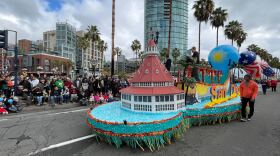Four Drug Enforcement Administration employees saw or heard a college student who was inadvertently left handcuffed in a DEA holding cell in Kearny Mesa without food or water for five days but did nothing about the situation, according to a U.S. Department of Justice report released today.
Daniel Chong, then 23, suffered acute renal failure, muscle degeneration and dehydration during the ordeal two years ago and was hospitalized for four days. Last summer, the government awarded him $4.1 million in an out-of-court settlement.
In its review of the case, the DOJ's Office of the Inspector General found a number of shortcomings in procedures employed by the DEA's San Diego office, including a lack of "any record-keeping methods to track detainee movements.''
Additionally, its holding cells contained no cameras, and it had no official policy or training "regarding the operation of the cell area, and no requirement that DEA personnel check the holding cells at the end of a day to ensure that all detainees had been properly processed, either for arrest or release,'' according to the document.
Moreover, DEA personnel were not required to sign in and out of the detention area, and there were no reliable electronic entry records for the relevant period "because the door-locking mechanism at the entrance to the detention area was not functioning properly,'' the report states.
"Accordingly, the OIG was not able to identify from electronic entry records or logs DEA personnel that entered the holding cell area during Chong's detention,'' the oversight agency concluded.
In response, the DEA stated that it "remains deeply troubled by the unfortunate incident surrounding Daniel Chong's detention.''
"Immediately following the incident, DEA implemented a new agency-wide policy for processing arrestees and detainees,'' according to the DEA. "These procedures closely mirror the OIG's recent recommendations, and include routinely inspecting holding cells, assigning an agent or task-force officer to the holding area and maintaining an occupancy ledger for holding cells. The DEA is confident that these measures will help to prevent similar incidents in the future.''
On April 21, 2012, Chong was arrested along with several other people during a drug raid on a University City home. Following an interview, DEA agents informed the UC San Diego engineering major that he would not be charged, but returned him to a 5-by-10-foot holding cell with his wrists cuffed behind his back, telling him they would be back momentarily.
He remained there until April 25, when federal officers uninvolved in his case found him.
During his detention, Chong drank his own urine, broke his eyeglasses and cut himself with them, and ingested methamphetamine he found.
Chong later told reporters he remembered screaming and hallucinating during the ordeal. Trying to get someone's attention, he kicked the door and repeatedly tried to set off fire sprinklers. He later received treatment for post-traumatic stress disorder.
The OIG began its investigation in the case due to an anonymous tip it received two days after Chong's detention ended.
The four employees who had seen or heard Chong during his detention told OIG investigators that they had found nothing unusual about their encounters with Chong in the detention cell and assumed that whoever had placed him there would return shortly to "process'' him.
The OIG investigation concluded that three case agents -- one DEA employee and two DEA task-force officers -- who were involved in the April 21 raid were responsible for the safe handling and welfare of all those detained during the operation, including Chong.
The personnel's "failure to ensure that Chong was released from custody after deciding that he would not be charged resulted in Chong's unjustified incarceration and his need for significant medical treatment,'' the OIG report states.
The agency also concluded that in addition to the case agents, a DEA supervisor was responsible for the safe handling and welfare of all detainees during the narcotics enforcement operation, and was accountable for Chong's extended detention as well.
"As the on-scene commander in the holding and detention area, the supervisor should have ensured that all detainees, including Chong, were either released or charged at the conclusion of the investigative operation on April 21,'' the document states.
The OIG further found that the supervisor violated DEA policy and "showed poor judgment'' by initiating an investigation of the incident without management's approval in the immediate aftermath of Chong's being discovered in the holding cell, and by assigning two of the case agents -- the two task-force officers -- to conduct the processing of Chong's holding cell for evidence.
That action was a violation of DEA policy that requires field divisions to notify the DEA's Office of Professional Responsibility of alleged misconduct.
The two case agents "had a clear conflict of interest, because they were among those whose conduct contributed to the improper detention of Chong and whose conduct was, therefore, subject to scrutiny,'' according to the report.
The OIG also concluded that DEA management improperly started a review of the incident before alerting the OIG. This decision "was contrary to Department of Justice and DEA policy, resulted in a delay of the OIG's investigation and could have caused harm to a potential criminal prosecution,'' the report states.







